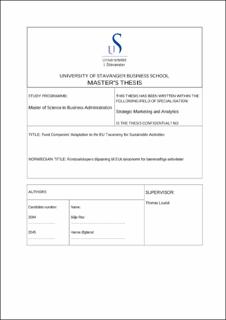| dc.description.abstract | In 2019, the European Commission presented the European Green Deal, a plan to achieve the goal of no net emissions of greenhouse gases by 2050 (European Union, 1995-2021a). Within this framework, an action plan on financing sustainable growth was developed (Financial Stability, Financial Services and Capital Markets Union, 2020). Central to this action plan is the establishment of a clear and detailed EU taxonomy for Sustainable Activities (Financial Stability, Financial Services and Capital Markets Union, 2020).
Financial market participants are required to prepare their first set of disclosures against the taxonomy by 31 December 2021 (EU TEG, 2020b). Based on this, it was desirable to study the impact of the taxonomy on fund companies, as well as how fund companies will use the classification system. On that basis, the following research question were formulated:
“How will fund companies adapt their investment strategy to the EU Taxonomy for Sustainable Activities?”
The research question was studied based on the topics of competition, investment frameworks and challenges of adaptation. Three hypotheses derived from the topics and were central to the analysis. A qualitative study was conducted using semi-structured interviews for data collection, where data was collected from five fund companies and two consulting companies. Key findings from the hypotheses was that all fund companies will adapt to the taxonomy due to market competition. However, competition will not have such a large impact on the extent to which they will adapt their investment strategy. The EU taxonomy will not be the main framework in fund companies' investment strategies, but will be a key supplement to other frameworks. It was also found that the fund companies experience challenges related to lack of data and information necessary for the taxonomy, which makes it difficult to adapt.
It was concluded that how fund companies will adapt their investment strategy to the EU taxonomy can be divided in two phases, the initial phase and the further phase. Although the taxonomy will apply to fund companies by the end of 2021 there will be a gradual adaptation. The classification system will be central to the companies' work, but will not govern all investments until it is fully developed. It is therefore concluded that fund companies will to a greater extent adapt their investment strategy when the classification system becomes more developed. | |
